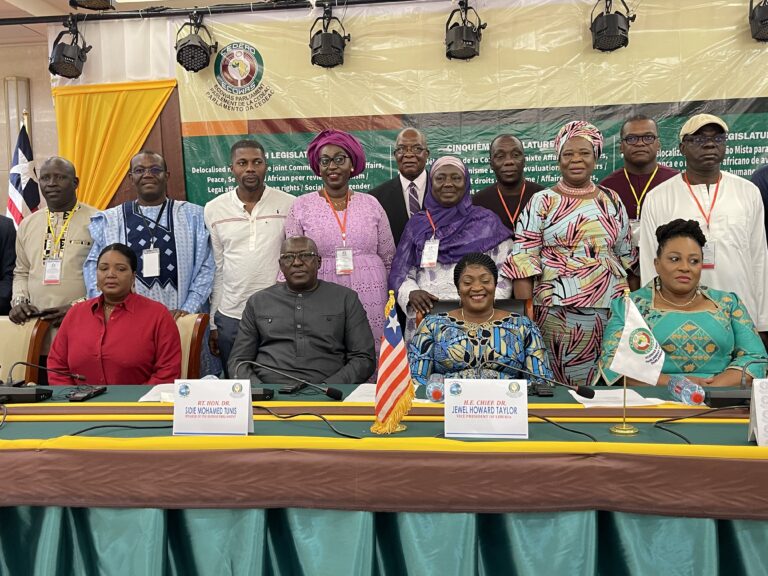WORLD
ECOWAS Speaker says inclusion of maginalised groups key to mitigating crisis in W/Africa

Hon. Sidie Mohammed Tunis, Speaker of the Economic Community of West African States (ECOWAS) Parliament has said that inclusion of marginalized, and vulnerable groups in governance is key to mitigating the crisis in the sub-region.
Tunis made this known on Tuesday at the opening of the delocalized meeting of the Joint Committees of the ECOWAS Parliament on Political Affairs, Peace, Security and the African Peer Review Mechanism, Judicial Affairs and Human rights, Social Affairs, Gender and Women Empowerment in Monrovia, Liberia.
Our correspondent reports that the Committee was meeting on the theme “Enhancing Political Inclusivity in the Participatory Governance Process: A mechanism for promoting Peace and Security.
According to Tunis, Inequality has been identified as one of the major factors causing rising crisis, including military coups and insecurity in the West African subregion.
He however noted that supporting the participation of people from vulnerable and marginalized groups in the decision-making and democratic processes of the societies is key to continued peace, security and sustainable development.
Tunis acknowledged that every meeting of the Parliament is an opportunity to analyze and make proposals to better understand and control political, economic, and social developments in West Africa.
Tunis, said that the meeting will focus on one of the priorities of ECOWAS Vision 2050, which is to promote good governance and consolidate irreversible peace, security, as well as development in the region, however said: “As we all know, inequality has been one of the bases or causes of subversive acts in our region.
“The marginalization of vulnerable groups from important decision-making processes, particularly ethnic or religious minorities, women and young people, provides fertile ground for conflict of violent extremism.
“We must convince ourselves that supporting the participation of people from vulnerable and marginalized groups in the decision-making and democratic processes of our societies is imperative for peace, security and sustainable development.”
“Political inclusivity has the advantage of enabling all points of view to be expressed and taken into consideration, and of enhancing the representation of every segment of the population, including women and young people, Tunis said”.
Liberia’s Vice President, Dr. Jewel Howard Taylor lamented that political inclusivity is still far from being achieved.
Taylor, citing statistics contained in the January 2023 UN Women Facts and Figures report, women on the continent particularly and globally in general are still yet to be accorded the acceptable number in distribution of political offices.
She noted that inclusive political processes are crucial to sustaining peace and conflict prevention; establishing and strengthening political processes aimed at improving the participation and political influence of citizens.
Taylor urged Parliamentarians on coming up with recommendations to chart the course of inclusivity, especially as regards women, and the vulnerable.
“Inclusivity would make governments and institutions more accountable and transparent, and building a stronger and more inclusive social contract between government and the people for greater access to opportunities, amongst other issues.
“I urge you as parliamentarians that as you navigate the discussions on the way forward towards greater peace and security in our sub-region.
“I crave your indulgence to proffer policy prescriptions which compel our National Governments to take affirmative actions for the inclusion of women at all levels in the Executive, Legislative and Judicial branches of governments.”
President of the ECOWAS Commission, Omar Alieu Touray also noted that the disconnect between the government and its citizens is a contributing factor to the volatility and threats to democracy in the sub-region.
Touray who was represented by Mrs Josephine Nkurumah, Permanent Representative of the ECOWAS Commission to Liberia urged Members of the ECOWAS Parliament to consider the role of civic engagements as a key strategy to building a more inclusive society.
He said that the ECOWAS Parliament’s delocalized meeting was apt and the Commission awaits recommendations from the meeting that it can work with the Parliament to ensure inclusivity of all ECOWAS citizens in the democratic process of the sub region.
“The seeming disconnects between the governed and those who govern have contributed in part to the volatility of the sub-region leading to discontent in our communities.
“It is pertinent that in other to have effective inclusiveness and participatory government processes, our citizens must be engaged, involved and discerning.
“We look forward to a collaborative effort to building a more inclusive society in our governance processes for peace and security which are prerequisite to our economic and social integration as a sub region,” Touray said.




 Davido's Net Worth & Lifestyle
Davido's Net Worth & Lifestyle 
